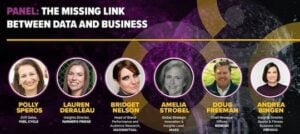To start off, we know that machine learning is not necessarily new. And everyone knows that it’s not new, but even in our own jobs and organizations, artificial intelligence has been employed. Machine learning has been going on for quite some time.
Bagalman points out, “A lot of the elements of machine learning come out of statistical analysis, which even goes back as far as the 60’s. Even what seems brand new, like ChatGPT, similar technologies have existed since the early 90’s. Even the technology that underlies things like ChatGPT has been around since about 2017. There’s a lot of experience that we have with these tools, and we know how to use them. We know how to implement them and get value from them.”
He continues, “The car is a great example of technology. A lot of people drive their car every day. But not that many people can open up the hood and know what’s going on under there. You just really have to know how to turn the steering wheel and how to use the accelerator and brake. And you must know what you’re going to use a car for when you need it. In business, we need to know when we should be using machine learning, how we can use it, how we can benefit from it but that doesn’t mean that every single executive in product design, finance and marketing must understand exactly how these algorithms work. You just need to know what they can do for you, and you need to know somebody who can make them work.”
As a case study, if you’re going to be developing a new ad campaign, it could be a new campaign for an existing product or service, or it could be a brand-new product or service—there is going to be machine learning algorithms involved in your planning upfront. You will be doing analysis of your prospective customers.
Bagalman further extrapolates, “You might be using clustering algorithms to do segmentation. You might be using reference modeling. You’re providing it as both strategic input, often to the creative team. You develop your campaign. You might do an initial soft launch with AB testing to find what works best. And that’s going to draw heavily on machine learning algorithms. You go full on with your campaign, especially the digital part. You’re going to be using multitouch attribution models that will be constantly targeting your performance on a daily basis. When it’s all wrapped up, you’re going to do an analysis to see what worked. You want to have general insights that you’re going to be able to apply towards the future. As you accumulate multiple campaigns, you can do marketing mix modeling. You can look back and you can consider things that you didn’t have at the time such as economic data, the competition, changes in supply chains. Feed that into a model that then guides your annual planning cycle and guides your strategy.”
These tactics can run your business through what was once a simple ad campaign, but now you’ve exploded it out to insights for running the organization.
“Machine learning can help you with strategic insights, with forecasting, with scenario planning and evaluation,” says Bagalman. “Of course, I would never turn over the entire running of my operation to even the best AI or machine learning algorithm. Think of all your information coming from your machine learning. Imagine you’re in a conference room with a bunch of other people trying to make your plan for the year, there’s a robot sitting in one of the chairs. And the robot has some thoughts. It’s been crunching some numbers. It’s giving you these ideas. You take it into account, but you also take into account the other human beings and their variance in their knowledge, intuition and creativity. But the robot can be really helpful. It knows a lot of stuff.”
Check out the full video from TMRE Continued for more on machine learning, as Michael Bagalman and Seth Adler discuss changing and adapting to technology, data science past, present, and future, and the skills needed to succeed.
Contributors
-

Seth Adler heads up All Things Insights & All Things Innovation. He has spent his career bringing people together around content. He has a dynamic background producing events, podcasts, video, and the written word.
View all posts -

Matthew Kramer is the Digital Editor for All Things Insights & All Things Innovation. He has over 20 years of experience working in publishing and media companies, on a variety of business-to-business publications, websites and trade shows.
View all posts

























































































































